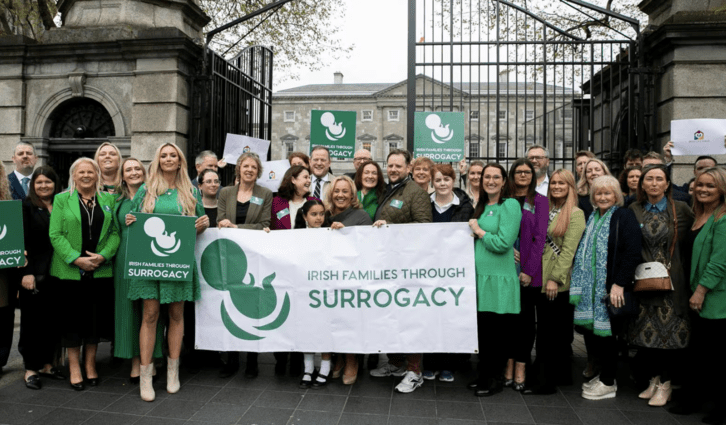Ireland has mummy issues. Nowhere is this more apparent than in the upcoming Assisted Human Reproduction Bill. The proposed legislation, which passed through the Dáil on Wednesday, would allow those who have been resident in Ireland for two years to hire women from a list of approved countries to serve as surrogates, gestating and giving birth to babies who will then be handed over to them.
The main body of the bill concerns the licensing of agencies engaged in international surrogacy and the establishment of new legal frameworks. So-called “intended parents” will have legal rights, even where the baby is born abroad, provided the child has a “genetic link to at least one” of them.
While the ban on commercial surrogacy remains in place, a “reasonable sum” can be offered, and it seems entirely likely this will open the door to pregnancy-as-employment. For example, legitimate expenses will include the loss of income by the surrogate mother for up to one year and the salary of a cleaner for the duration of the pregnancy. There are a range of safeguards in place to ensure that prospective surrogate mothers are not exploited, but whether these will be respected in jurisdictions outside Ireland remains questionable.
With fertility rates plummeting across the world, the baby-making business is set to boom; in 2022 the surrogacy industry was valued at $14 billion. Given the swelling commercial clout, it seems likely smaller countries will cave to domestic and international pressure by loosening laws.
The Irish bill will bring the country closer to the UK, which allows for altruistic surrogacy. Notably, while Russia and Ukraine have lax laws and effectively allow surrogate mothers to be paid, all forms of the practice are outlawed across much of Europe, including Italy, Spain, France and Germany.
Many of the bill’s proponents have heralded it as marking progress toward equality between same-sex and opposite-sex couples, toward a forward-looking Ireland free from the scandals of its Catholic past.
The bill’s righteous and progressive aims were cemented in January when the Pope called surrogacy “a grave violation of the dignity of the woman and the child, based on the exploitation of situations of the mother’s material needs.” “A child is always a gift and never the basis of a commercial contract,” he added.
Chair of the Fine Gael parliamentary party, Alan Farrell TD, swelled with pride during a debate on the bill as he reflected: “We have seen dramatic changes in women’s rights and LGBT rights in Ireland, led by the public and pursued by the Government. This bill is the latest where successive governments have sought to build on that progress and deliver real change that reflects more understanding and an equal country.”
A spokesperson from the LGB rights group “Not All Gays” told me that opposition to the legislation has been framed as “anti-LGBTQIA”. “When will they stop weaponising LGB’s struggles and genuine homophobia to push for ethically dubious laws that could be plucked straight out of Gilead?” she asked. “We are not your shield to be used to silence reasonable debate or opposition to laws that seek to erode the rights and civil liberties.”
Just as with the dissolution of women’s rights at the hands of trans activists, this most recent threat to women’s dignity, health and happiness has come cloaked in the rainbow flag. But in reality, it signifies nothing more than a social shift toward the commercialisation of women’s bodies.
It is a triumph of market forces, of the state-sanctioned use of wombs for the production of a designer accessory. Provided the mother meets the minimum requirements, couples and individuals who have commissioned babies will be able to pose with them for Instagram snaps as soon as the mother has given birth.
The bill will probably pass into law, and Ireland will become a land where virgins may indeed become mothers. It is conceivable that future generations will look back on the period of legalised surrogacy with horror as we now do the brutal homes where unmarried mothers had their infants ripped from their care.











Join the discussion
Join like minded readers that support our journalism by becoming a paid subscriber
To join the discussion in the comments, become a paid subscriber.
Join like minded readers that support our journalism, read unlimited articles and enjoy other subscriber-only benefits.
Subscribe